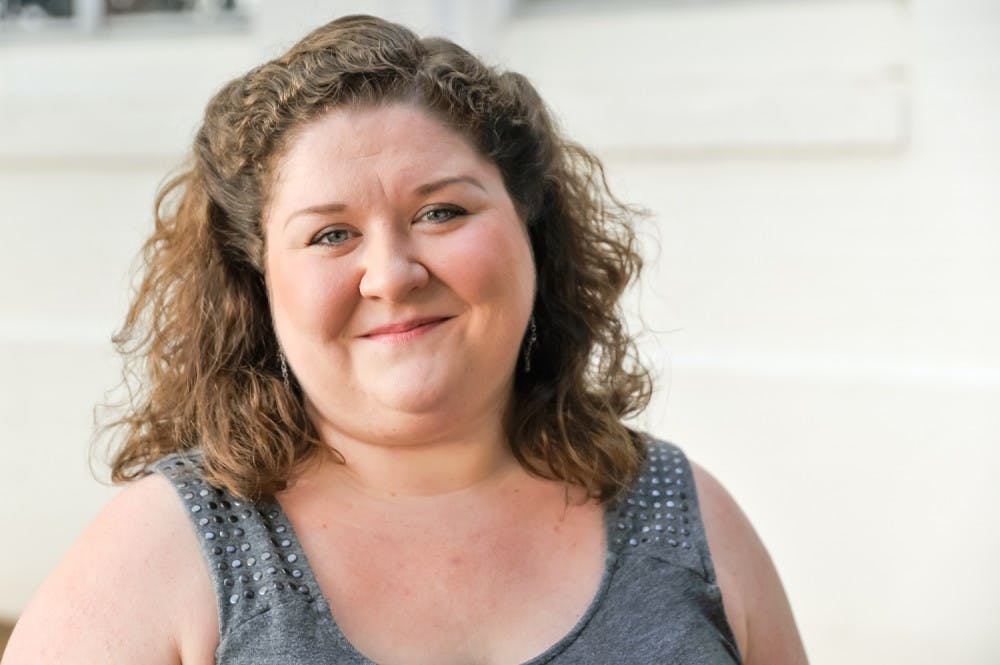As an instructor and student services coordinator at ASU, an adjunct faculty member at
But that doesn't stop her from walking out of the theater every night with a spring in her step.
Despite all the stress involved with her many roles, Scott said she always leaves rehearsal feeling more energized than when she entered. That's how she knows she's in the right place.
"The most enjoyable part of theater is creating something that's greater than the sum of its parts," she said. "It's about the rush of ideas in the collaborative process. It's about making something that wasn't there before and might never be there again."
Scott said her interest in performing arts began when she was growing up in
During her senior year of high school, Scott directed a two-person student play. She said that was a turning point and she "totally caught the bug" for directing.
"I've always loved, maybe perversely, the ephemeral nature of theater," she said. "The fact that you put all this work into something that only exists in a certain moment in time. I found that poetic, even as a kid."
Scott attended
Her decision to move to
"The program gave me a lot of freedom to practice, to experiment and to fail," Scott said. "I was able to work on both small independent projects and full main-stage productions with a full staff."
Staying in
"Hell no!" she laughed. "If you told me when I was moving out here for grad school that I would still be here now, I would have laughed you out of town. But life is strange."
No single factor made her decide to stay in
In fact, she said most people start out with an incorrect understanding of what the concept of experimental theater means.
"I think a lot of people think that experimental art means you just throw whatever on a canvas, or on the stage, and see what happens," she said. "In fact, it can be very rigorous and highly-structured, and it often has to be in order to exist at all. The goal is to take artistic risks, and that's always more challenging."
In 2012, Scott was asked to be the dramaturg, someone who researches and develops plays, for a show at Orange Theatre as a result of her past experience working with founder Matthew Watkins. Her role eventually grew and now she also serves as an associate artistic director.
She described the work of Orange Theatre as "radical adaptations and interpretations inspired by existing work." While the idea of experimental theater is fundamentally broad, she said the environment for the theater emerged from a common goal of the artists to spend more time developing and improving works.
"We were all really frustrated by the process in traditional mainstream theater where you rehearse for a few weeks, tech the show, put it up and then it's over," Scott said. "You never really get a chance to take the artistic risks you can take if you have a longer development period."
Orange Theatre's model looks a lot different from most other companies. Its productions focus on integrating multimedia elements, abstraction and aesthetics over the traditional form of theater centered around a strict narrative or moral. It also relies heavily on audience feedback and participation.
Scott said the company's goal is for its audience members to walk away analyzing the work in a way that fosters creative thinking.
"We're more interested in provoking the questions than we are offering the answers," she said.
In an effort to make its shows accessible to everyone in Phoenix, all Orange Theatre productions are hosted as pay-what-you-can shows, meaning each audience member has a choice of how much to contribute in exchange for their ticket. The producers' hope is that the business model will bring in people who wouldn't get to enjoy experimental theater otherwise.
Scott said she enjoys her career in professional theater as well as her role teaching the next generation of artists at SCC and ASU. In fact, teaching and directing are actually very similar, she said.
"In teaching and directing, there's a lot of crossover," Scott said. "The skills are communicative. They both involve hearing where a person's at and trying to understand what they're thinking, then translating that and helping them come to a clear idea of their goals."
William Partlan is an associate professor and the head of directing in the ASU School of Film, Dance and Theatre. He worked with Scott several years ago when she was a MFA student, and now he supervises her in her role as an instructor at ASU.
Partlan said the roles of directing and teaching fit together nicely, and he praised Scott's ability to use her skills for both.
"Joya has a wonderful combination of directing and administrative skills," he said. "That combination is particularly useful for someone who wants to teach and direct professionally."
He said the mix of abilities is often the mark of a great teacher, and more teachers could aim to make the classroom a collaborative atmosphere.
"I absolutely believe all teachers can bring it to their work," he said. "Many of the best professors and teachers at any level have figured out ways to engage in that."
Randy Messersmith is the theatre arts director at
"I would describe Joya as a bundle of positive energy," Messersmith said. "She's just a joy to be around. She's an incredible collaborator, a team player (and she) loves working in groups and working in non-traditional ways. She's very innovative, a free thinker and she's open to new ideas."
He said he feels very fortunate to work with Scott at SCC, both during the academic year and summer.
"She's part of our family here, and she makes all of us better," Messersmith said. "She gets us to think about questions we didn't even know we needed to ask."
Reach the reporter at skylar.mason@asu.edu or follow @skylarmason42 on Twitter.
Like The State Press on Facebook and follow @statepress on Twitter.




